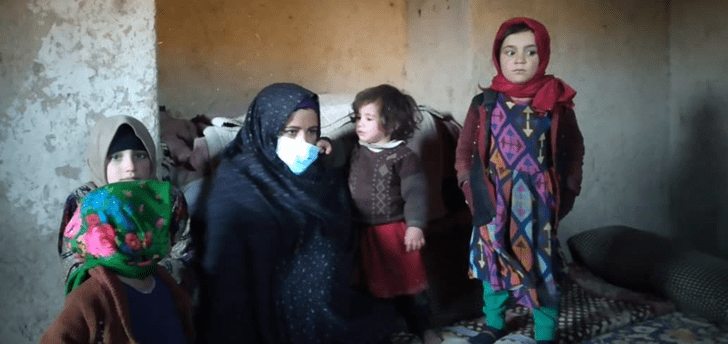QALA-I-NAW (Pajhwok): Widows in northwestern Badghis province, who are caring for their children, are facing hardships of life. They hope for lasting peace in the country in order no other women like them become widows and no children are orphaned.
Samia, a 27-year-old resident of Qadis district in Badghis province, has been living in Qala-i-Naw city of the province for over a year after her husband, a policeman, was killed in a clash with insurgents in the previous government.
year after her husband, a policeman, was killed in a clash with insurgents in the previous government.
A mother of four daughters and a son, she has taken refuge in Qala-i-Naw from Qadis district after her husband was killed.
She is currently spending the harsh winter with her children in a mud house with old mattresses and carpets without basic amenities of life.
“If there was no war between the brothers, my husband would have been alive today,” said Samia, who was sitting with her children in a room with a black shawl on her head. Looking at the picture of her dead husband on the wall, she said: “We had a happy life, but the war made me a widow and rendered my daughters fatherless.”
The woman recalled bitter days of her widowhood and said: “Thousands of women like me have become widows, there are thousands of girls and boys like my children whose fathers have been martyred. “
“As long as my husband was alive, we had a good life.” She said that on the evening of her husband’s death, she wept bitterly and she prayed to Allah (swt) for lasting peace in the country.
She said that today, when there is less peace and stability, it must be maintained, every Afghan must strive for greater stability, so that the war in Afghanistan can end, the country can progress and become a developed country.
“I am a widow who has tasted the bitter taste of war. There are thousands of other women like me who are wearing the black veil of widowhood. All mothers should give their children peace and teach them mutual tolerance.”.
She said women were not widowed as a result of the war, but in Afghan society their husbands were killed in domestic violence, ethnic and linguistic differences, land disputes and dozens of other cases.
Maryam is another widow from Badghis who lived in Qadis district of the province but took refuge in Qala-e-Naw after her husband was killed.
husband was killed.
Speaking to Pajhwok, she said: “My husband was the only person with whom I had a comfortable life, but last year a rocket hit his shop during a battle between the Taliban and the Ghani government and he was martyred on the spot.”
Maryam’s throat filled with remembrance of her husband’s death and she was silent for a moment, then after a few minutes she said in a trembling voice: “My husband was neither a Taliban, nor a Mujahid, nor a soldier, but a neutral person. Why was he killed so cruelly?” She said that after her husband’s death, she was taking care of her three orphaned daughters.
According to her, the caretaker government should provide employment opportunities to widows who are able to work, so that they can find a decent food and stand on their own feet.
“Before my husband’s death, I had a good life. Our house was not destroyed like this. My daughters went to school,” she said.
The widow raised her hands in prayer with tears in her eyes and said, “I wish the peace that came to our country would last forever.”
More than four decades of war and insecurity in Afghanistan have forced millions of Afghans to flee the country and hundreds of thousands have been displaced. Some sources put the death toll at more than one million and some at two million.
ma







GET IN TOUCH
NEWSLETTER
SUGGEST A STORY
PAJHWOK MOBILE APP